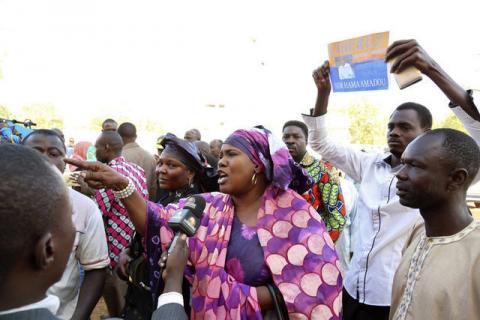Advertisement
Nearly a quarter of Niger voters barred from February election
NIAMEY (Reuters) - Nearly a quarter of Niger's potential voters - 1.5 million people - will be barred from casting ballots in next month's presidential poll, the government said, after politicians failed to agree on a system for registering them.
Because the voters lacked documentation to prove their identity, the Independent National Electoral Commission had proposed a system of using witnesses to vouch for them. But politicians failed to approve it at a meeting on Friday.
"There was no consensus among the political class and therefore 1.5 million Nigeriens cannot exercise their right to vote on 21 February," Alkassoum Indatou, a spokesman for the presidential majority, said on state TV on Friday night.
There was no immediate reaction from electoral officials or from the rights groups who regularly accuse the government of crackdowns on the opposition.
The main opposition parties confirmed the impasse, saying some politicians refused to accept the voters because the country's electoral law excludes voting by witness. It was not clear whether the problems would affect some parts of the country or political blocs more than others.
Tensions were already running high in Niger, a landlocked, impoverished country on the edge of the Sahara Desert. It has a population of 19 million, of which only 7.5 million are on the electoral register.
In the streets of the capital Niamey, would-be voters expressed frustration at the decision.
"I'm very unhappy because I wanted to choose my own representatives," said Amadou Garba, a merchant, who lost his documents in a fire. "I want this question re-examined"
The opposition accuses incumbent President Mahamadou Issoufou of becoming increasingly authoritarian - but the government has underscored the need for order amid security threats, including an alleged attempt to topple Issoufou last month.
One of the main opposition candidates, Hama Amadou, is in jail on charges related to a baby-trafficking ring. He denies the charges and says they are politically motivated.
Another presidential candidate, Adal Rhoubeid, returned to the capital, Niamey, on Friday night after being questioned over attacks in a hotel and cafe in Burkina Faso last week that killed 30 people, including many foreigners.
"Tragic events (in Ouagadougou) confirm something that is becoming more and more clear: terrorism is a cancer across the Sahel and Sahara," Rhoubeid said in front of a large crowd of supporters at the airport, adding that his MDR party supported compulsory military service.
(Additional reporting by Souleymane Ag Anara; Writing by Emma Farge; Editing by Larry King)



















Add new comment